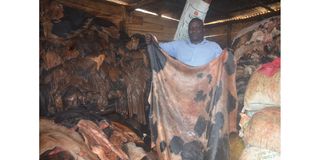Why leather factories in Jinja have closed

Mr Araf Wambedde in his hides and skin store at Jinja City Abattoir. PHOTO | TAUSI NAKATO
What you need to know:
- Leaders say the closure of the factories has affected the economy of Jinja.
Four leather factories in Jinja City have closed, leaving hundreds of former workers unemployed.
The factories are; SWT Leather Industries located on Mutibwa Road, Mehaka Leather Exim Smc Limited, Uganda Leather and Tannery Industries, Jinja, and Loyal Small Scale Industries located on Nile Crescent Road.
The head of membership and administration at Uganda National Chamber of Commerce and Industry, Jinja Branch, Mr Moses Mulondo, attributed the closure of the factories to a lack of enough raw materials.
“These factories were producing below capacity because the supply of hides and skin was lower than the demand,” he said.
Mr Mulondo said the collapse of the industries has affected the economy of Jinja.
“These factories used to employ many people, especially casual labourers. The closure has created unemployment in Jinja City, he said.
The Jinja City Deputy Speaker, Ms Sirina Kyakuwaire, said the collapse of the industries has affected revenue collection.
“We used to collect taxes in those industries and their closure has affected our revenue collection yet residents are expecting good roads, street lights, and a clean city without garbage, among others,” she said.
Mr Arafa Wambede, a dealer in hides and skins in Jinja City, said they have only one leather factory remaining; Skyfat.
“If the proprietors of Skyfat Tannery stop buying our hides and skin, we shall have nowhere to sell them because the other industries have closed,” he said.
Mr Wambede said low export volumes have also caused the drop in prices for the last five years, from Shs3,000 per kg to as low as Shs500.
“The prices dropped from Shs3,000 to Shs1,400 per kilogramme in 2022 and are currently low at Shs500. There has been a monthly price deduction of Shs100,” he said. Mr Wambede said they used to export wet-blue leather, that is, unfinished hides that have been dehaired and tanned with chromium salts and sulphate. However, he said the market is no longer available.
“The Chinese from Skyfat currently use hides and skin for making food, which they export to China because the export market for wet-blue leather is no longer available,’’ he said.
The General Secretary of Jinja City Abattoir, Mr Ronald Mutabi Byarugaba, said the price fluctuation has affected the business. “The prices have dropped from Shs3,500 for the skin of a cow to between Shs400 and Shs500 and the prices of goat hides have fallen from Shs10,000 to Shs1,500 and Shs2,000, which has affected our businesses,’’ he said.
Mr Byarugaba said the demand for the hides and skins abroad is high but they lack the export licences.
The chairperson of Jinja City Abattoir, Mr Chrizestom Kagolo, attributed the drop in the prices to the government ban on the exportation of raw hide and skin.
Export ban
“The hides and skin were being exported when they were still fresh but when the government allowed only the exportation of wet-blue leather, traders lost the market,’’ he said.
Mr Kagolo said some traders had a market in Nigeria where hide and skin are used as food but they also lost it. Mr George Katongole, the chairperson of Kamuli Municipality Cattle Traders Association, said a kilograme of hides and skins costs between Shs200 and Shs300 per kilogramme in the area.
Mr Katongole said the hides and skins are currently rotting in their stores because their prices are determined by forces of demand and supply.
Mr Samson Ojune, the chairperson of Katakwi Cattle Traders Association, attributed the drop in the prices of hides and skins to high taxation by the government.
“When the government intervened in hide and skin businesses and started taxing it, we lost the export market and if a country has signed a memorandum of understanding with other countries and you breach it, you lose the market,” he said.




